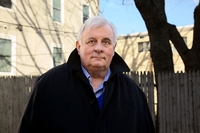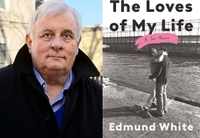The Farewell Symphony
Edmund White. Knopf Publishing Group, $25 (416pp) ISBN 978-0-679-43477-1
Marked equally by erotic fervor and lyrical intensity, the final installment in White's autobiographical trilogy (following A Boy's Own Story and The Beautiful Room Is Empty) is also the longest, the most baroque and the most elegiac. It carries us from the heady days of the Stonewall Riots through the ravages of AIDS. As usual, White subordinates his interest in the larger matters of recent gay history to the task of vividly evoking the men in the narrator's life through whom those events are understood--usually in a sympathetic, Proustian effort at social taxonomy. The giggling, snobbish, closeted ""White Russians"" slumming at the Stonewall typify one kind of gay man, just as Brandy--a sequined and exquisitely theatrical drag queen--represents another. The narrator literally embraces many of them--he seems perpetually as surprised by his catholic tastes in men as he is by the fetishes of others. The novel is invigoratingly, rigorously artificial, flirting with mannerism even as it celebrates esprit and erudition in others (one James Merrill-esque poet dismisses some Japanese scrolls as ""the usual swirls before pine""). Expatriate life, first in Rome and then (for a more extensive period) in an initially inhospitable Paris sharpens the narrator's sense of isolation; a rejection slip for his novel sends him into suicidal despair--from which salvation lies (typically) in a liaison with a Danish tourist. As the narrator's writing career flourishes, he finds himself in the rarefied company of powerful, learned editors, poets and novelists--company that intersects rather than stands distinct from the priapic habitues of Greenwich Village. Extended episodes involving his mother's decline into illness and dementia, his father's death and his sister's coming to terms with her lesbianism highlight the insularity of the narrator's world. The book is best enjoyed not for a strong story--indeed, the Brice for whom the narrator mourns at the beginning and close is rather peripheral--but for its luminous snapshots of New York, Paris and Rome and of the vital parade of men--dowdy, forbiddingly gorgeous, sylph-like, ephebic, closeted, defiantly and militantly out--that crowd its pages. BOMC selection; first serial to the New Yorker. (Sept.)
Details
Reviewed on: 07/31/1997
Genre: Nonfiction
Hardcover - 978-0-517-40943-5
MP3 CD - 978-1-5113-4180-6
Open Ebook - 317 pages - 978-0-307-76447-8
Paperback - 432 pages - 978-0-679-75476-3



